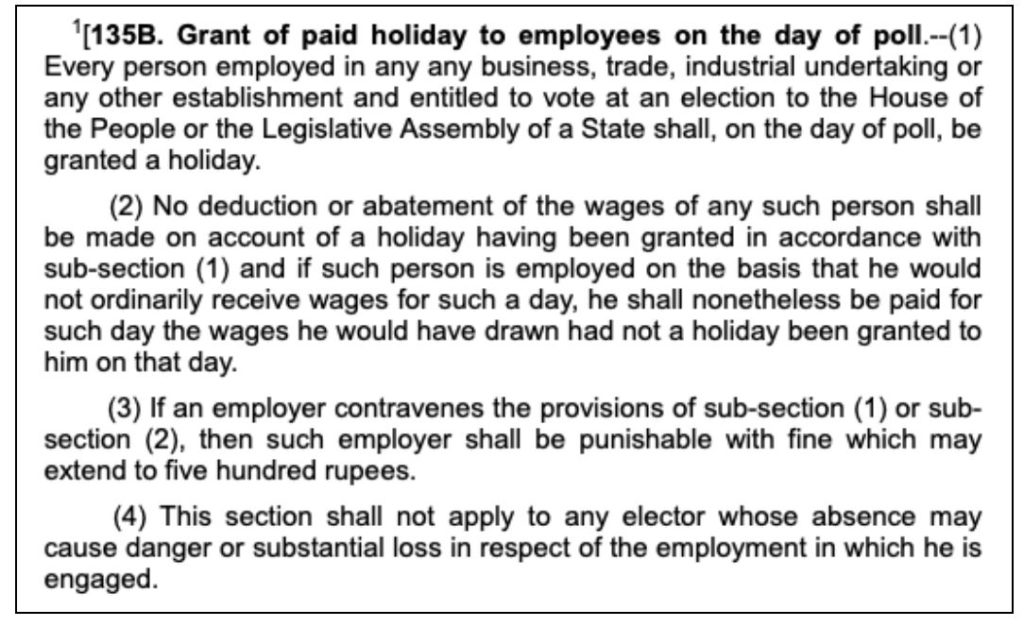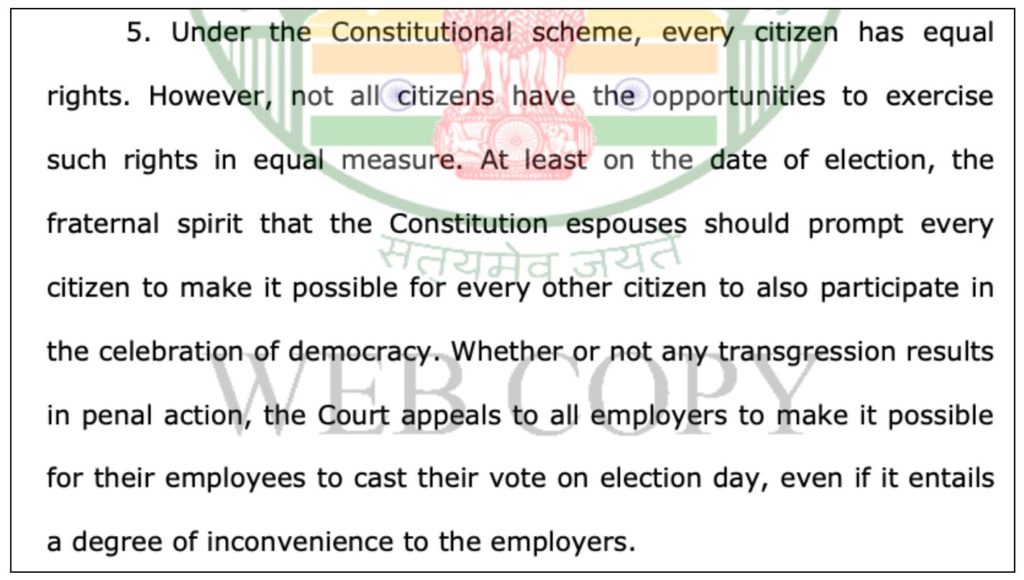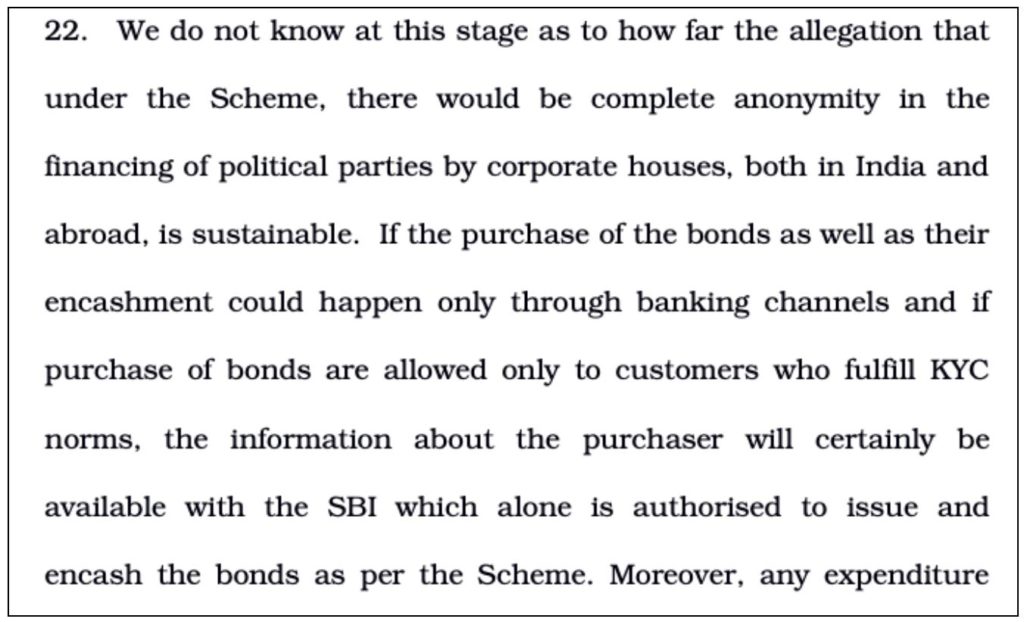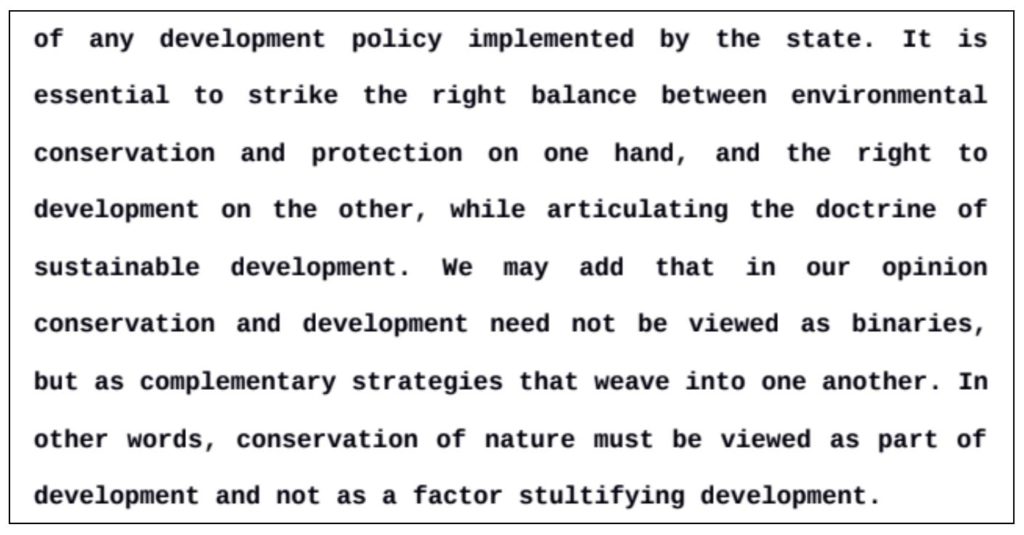In this roundup of the important court judgments, we look at directions about improving the condition of fishermen, enabling unorganised sector employees to exercise their voting rights, electoral bonds, and constitution of an expert committee for coming up with guidelines regarding cutting of Trees for developmental projects.
Madras HC: Organise the fishing sector and educate fishermen in respect of hygiene and presentation.
In the case Fisherman Care vs. Union of India & Ors., the Madras high court held that the condition of fishermen should be improved in terms of hygiene, access to insurance and credit facilities, and the fishing sector should be organised.
The high court was hearing a plea by an association of fishermen, which sought to espouse the cause of the four local fishermen who were recently killed on 18 January 2021, by an attack apparently at the hands of the Sri Lankan navy, for allegedly straying beyond the territorial waters of India. The petition requested the award of adequate compensation to the family of the deceased fishermen and provide a government job to the legal heirs of the deceased fisherman’s family and consequently issue directions to take appropriate action in accordance with criminal law against the offenders.
With respect to the demand for compensation and government jobs for the legal heirs of the deceased fishermen, the high court permitted the petitioners to make an appropriate representation to the Department of Fisheries of under Central Government and Department of the Animal Husbandry and Fisheries under the State Government for consideration.
With respect to the question of an investigation into the crime, the court noted that even though the FIR has been lodged in Rameshwaram, the Centre and the State should coordinate to specify a particular authority, that would head the investigation and bring the matter to a logical end by giving a due closure to the families of the deceased fishermen.
The bench of Chief Justice Sanjib Banerjee and Justice Senthilkumar Ramamoorthy observed that since fishing is a completely unorganised sector, where most fishermen are not registered, the primary task is to organise the sector and educate fishermen in respect of hygiene and presentation. Further, the bench also observed that, apart from housing benefits, insurance and credit facilities need to be made available to the fishermen. In the view of the quantum of pay-out awarded to fishermen during the 61-day period each year when fishermen are not allowed to venture into the sea, the judges remarked that it should be increased as the fishermen are kept away from their only means of earning for a substantial period pursuant to the laws made by the Centre.
Madras HC: Employers should make it possible for their employees to cast their vote on election day
In the case M.A.Shahjahan v. Chief Electoral Officer and Principal Secretary to the Government State of Tamil Nadu Public, the Madras high court held that every citizen should make it possible for every other citizen to participate in the celebration of democracy.
The high court was hearing public interest litigation filed to ensure that pursuant to the Section 135B of the representation of the People Act, 1951, labourers working in the unorganized sector and in private employment are afforded a chance to participate in the exercise of voting at the ensuing state elections.
Section 135B of the Representation of the People Act, 1951, mandates that election day would be a paid holiday for employees engaged in any business, trade, industrial undertaking, or any other establishment. The PIL submitted that, as a matter of fact, employers do not allow the concerned employees to take a day off and there is little done to enforce the provision. The Election Commission has said that the fine is so insignificant that the provision does not work effectively as a deterrent.

The high court held that both the State Government and the Election Commission should publish appropriate notifications to make the employees aware of their rights so that the employees may assert themselves and take appropriate steps to exercise their franchise. The notification from the Election Commission may also indicate that subsequent complaints may be entertained and if found credible, the complaints may result in criminal proceedings being instituted.

The bench of Chief Justice Sanjib Banerjee and Justice Senthilkumar Ramamoorthy held that all employers should make it possible for their employees to cast their vote on election day, even if it entails a degree of inconvenience to the employers.
Supreme Court: Refuses to stay Electoral Bonds; Sufficient Safeguards available as purchase and encashment of bonds happening only through banking channels and reflected in public documents
In the case Association for Democratic Reforms vs. Union of India & Ors., the apex court held that purchase as well as encashment of the bonds, happening only through banking channels, is always reflected in documents that eventually come to the public domain.
In 2017, petitions were filed challenging the provisions of Finance Act 2017 which paved the way for anonymous electoral bonds. The Finance Act 2017 introduced amendments in the Reserve Bank of India Act, Companies Act, Income Tax Act, Representation of Peoples Act, and Foreign Contributions Regulations Act to make way for electoral bonds. However, the case became alive only by March 2019.
In the present judgement, the apex court maintained that since the electoral bonds were allowed to be released in 2018, 2019, and 2020 without interruption, and sufficient safeguards are there, there is no justification to stay the electoral bonds at present. Hence, the petitions requesting a stay on the fresh issue of electoral bonds were dismissed. The main petition that challenges the electoral bonds scheme is still pending before the apex court.
The apex court observes that although the Electoral Bond Scheme 2018 provides anonymity, the Scheme is intended to ensure that everything happens only through banking channels. While the identity of the purchaser of the bond is withheld, it is ensured that unidentified/ unidentifiable persons cannot purchase the bonds and give it to the political parties. Though the information furnished by the buyer shall be treated confidentially by the authorised bank and shall not be disclosed to any authority for any purposes, it is subject to one exception namely when demanded by a competent court or upon registration of a criminal case by any law enforcement agency.
The bench of Chief Justice of India SA Bobde, Justices AS Bopanna and V Ramasubramaniam held that, at this stage, it is not clear as to how far the allegation of complete anonymity in the financing of political parties by corporate houses, both in India and abroad, is sustainable.
The judgement explains that if the purchase of the bonds, as well as their encashment, could happen only through banking channels, then the financial statements of companies that purchase Electoral Bonds will have to necessarily reflect the amount spent by way of expenditure in the purchase of Electoral Bonds.

Since the Scheme mandates political parties to file an audited statement of accounts and also since the Companies Act requires financial statements of registered companies to be filed with the Registrar of Companies, the purchase as well as encashment of the bonds, happening only through banking channels, is always reflected in documents that eventually come to the public domain. Hence, all that is required is a little more effort to cull out such information from both sides (purchaser of bond and political party) and do some “match the following”. However, this observation of the court does not seem to be valid since companies are no more required to disclose names of political parties, they made a contribution to and are only required to disclose the total amount of political contribution. In such a case, no amount of match the following may help in identifying the donor & the respective recipient.
Further, the court also rejected the contention that that though the first purchase may be through banking channels for a consideration paid in white money, someone may repurchase the bonds from the first buyer by using black money and hand it over to a political party. The court emphasised that this contention arises out of ignorance of the Scheme as, under Clause 14 of the Scheme, the bonds are not tradable.
Supreme Court: Constituted an expert committee for formulating scientific and policy guidelines with respect to cutting of trees for developmental projects.
In the case Association for Protection of Democratic Rights & Anr. vs. State of Bengal & Ors., the apex court constituted an expert committee for formulating scientific and policy guidelines with respect to cutting of trees for developmental projects. The issue before the court was whether to allow the Government of West Bengal to fell tress in order to construct Road Over Bridges (ROBs) and widen the roads.
The state submitted that the ROBs is a development concern and it is necessary to prevent accidents. The said ROBs can only be constructed after felling of trees that are said to be more than 150 years old. The court notes that, as per the Report of the Expert Committee, about 50 trees have already been felled and another 306 trees are to be felled. Many of those trees are also called ‘historical trees’, which have irreplaceable value.
The judgement observes that the right to clean and healthy environment has been recognised as a fundamental right under Article 21. Additionally, Article 48-A imposes a duty upon the State to endeavour to protect and improve the environment and safeguard the forest and wildlife of the country. Further, India is party to international treaties, agreements and conferences that have committed themselves to sustainable development and growth.
Therefore, the bench of CJI SA Bobde, Justices AS Bopanna and V. Ramasubramanian emphasises that it is important to strike a balance between environmental conservation and protection on one hand, and the right to development on the other, while articulating the doctrine of sustainable development. The judgement also highlighted that it is imperative to make a realistic assessment of the economic value of a tree, which may be permitted to fell.

In this view, the supreme court constituted an expert committee for formulating scientific and policy guidelines with respect to cutting of trees for developmental projects. The court directed the committee to submit its recommendations on the following aspects within four weeks from the date of its first meeting:
- These guidelines may specify the species of trees in categories based upon their environmental values considering the age and girth of the trees etc.
- The guidelines may provide special treatment for geographical area or eco-sensitive area. They may identify areas which need to be regulated and even identify a minimum threshold beyond which the guidelines will apply.
- The guidelines shall prescribe a mechanism for assessment of both intrinsic and instrumental value of the trees, based not only on the value of timber, but also the ecosystem services rendered by the trees and its special relevance, if any, to the habitat of other living organisms, soil, flowing and underground water.
- The guidelines shall also mandate rules regarding alternate routes/sites for roads/projects, and possibilities for using alternate modes of transport like railways or water-ways.
- The guidelines shall also prescribe the mode of compensation financial and otherwise, the stage of depositing such compensation and the process that governs the computation and recovery. In this regard, the committee may consider the existing regulatory framework regarding calculation of Net Present Value (NPV) and may suggest necessary modification.
- In addition, the guidelines shall also specify the manner and mechanism of compensatory afforestation to be carried out using the deposited compensation, consistent with the native ecosystem, habitat and species.
- The Committee may consider the need for any permanent expert body and its proposed structural form.
Featured Image: Important court judgments


